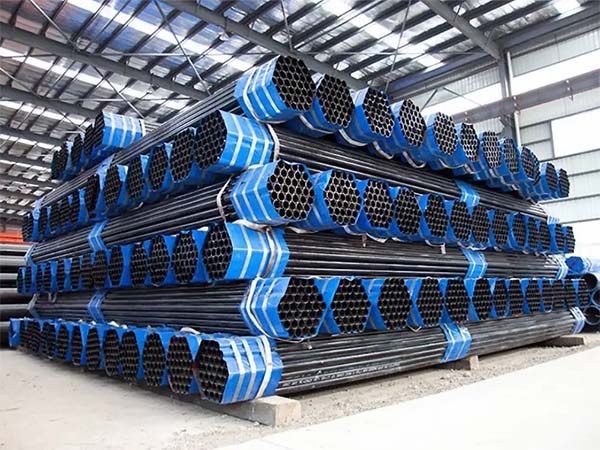ERW (Electric Resistance Welded) carbon steel pipe is a kind of steel pipe that heats the edge of the steel strip by high-frequency current and is welded and formed under pressure. It is renowned for its high cost-effectiveness and wide range of applications.
ERW carbon steel pipes are usually processed from steel coils. After undergoing pretreatment steps such as uncoiling, flattening and edge trimming, the steel coils are sent into a plate rolling machine to be rolled into tubular structures. Subsequently, the edges of the strips are welded together using high-frequency current to form a complete steel pipe.

During the welding process, the heat generated by the high-frequency current rapidly and evenly heats the edge of the strip, ensuring the strength and sealing of the welded joint. After the welding is completed, the steel pipe still needs to go through a series of inspection and treatment steps, such as online ultrasonic testing, hydrostatic testing, and inner and outer surface treatment, to ensure its quality and meet specific application requirements. These steps jointly ensure the reliability of ERW carbon steel pipes in terms of structural integrity and performance.
Specifications and standards of ERW carbon steel pipes
Outer diameter range: Between 0.5 "(approximately 12 millimeters) and 28" (approximately 710 millimeters).
Wall thickness (schedule) : The thickness ranges from 1.0 mm to 20 mm. Common specifications include Schedule 40 and 80, all in accordance with the ANSI/ASME B36.10/36.19 standard.
Length: The length range is from 3 to 12 meters, and it can also be customized according to customer requirements.
End processing: It offers various end processing methods such as flat end, inclined end and threaded end.
Standards: ASTM 5L, ASTM A53, ASTM A178, ASTM A500/501, ASTM A691, ASTM A252, ASTM A672, EN 10217
Steel grade:
API 5L: PSL1/PSL2 Gr.A, Gr.B, X42, X46, X52, X56, X60, X65, X70
ASTM A53: GR.A, GR.B, ASTM A500 JIS G3466
EN: S275, S275JR, S355JRH, S355J2H, EN10219-1, EN10217-1
Performance requirements
Yield strength: 35 000-65 000 psi (about 240-450 MPa), depending on the grade.
Tensile strength: 58 000-80 000 psi (about 400-550 MPa).
Elongation: 20-30%, with good plasticity and toughness.
Main advantages
Low cost: Compared with
seamless steel pipes, its price is more advantageous and the production efficiency is high.
Outstanding consistency: The welding is uniform and consistent, with precise dimensions, ensuring the high reliability of the product.
It has a wide range of applications: it is suitable for multiple fields such as oil and gas transportation, building structures, water network pipelines, agricultural irrigation, automotive exhaust systems, and mechanical structures.
Environmentally friendly and recyclable: The carbon emissions during the production process are relatively low, and the steel itself is easy to recycle and reuse.
Typical applications
Oil and gas transportation: API 5L X series pipes, ranging from grade X42 to X70, are widely used in surface and offshore pipeline construction.
Municipal engineering: Schedule 40 steel pipes are commonly used in drinking water, sewage treatment, heating networks and drainage systems.
Structural engineering: Applied to building columns and beams, bridge support structures, and industrial structure pipe fittings.
In the mechanical and automotive industries: Pipes are used to manufacture mechanical structural components, automotive chassis and exhaust system parts.
